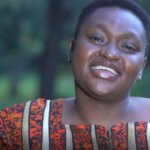The schools Mokhudu Machaba, went to is nothing like what South Africa is offering today. In fact, in the cities it is much better than the rural areas. That’s why she decided that, after her training she would take the knowledge she gained from teaching city kids to her hometown.
She wanted to take Johannesburg standards and Johannesburg education to Polokwane, her hometown and her innovation in teaching worked.
“It is still challenging and tough but I’m trying my very best because all the kids that I have started teaching, I have managed to encourage them, motivate them, help them gain more resilience and to teach them to love education.”
“Most of them are working and some of them are at the university; they still come and visit me and they tell me their story of successes,” she added.
“So they come back and tell me their stories, what challenges they have experienced, how they stood their ground to make sure they get their education.”
And this all began with her improvising in her primary school.
“I introduced project-based teaching, knowing that we didn’t have resources to experiment and practical lessons. I also used the indigenous knowledge. So I knew we grew up doing certain things in a way.”
“I engaged members of the community to come and assist in the indigenous ways of doing things so that I can build confidence in them. So that they can understand that even if they will live in the modern world they will still have to embrace who they are and they will still have to use what they know to make change.”
So she would get local people to teach her pupils in local culture so that her pupils could be proud of who they are.
One way learning and knowing about local culture saved a very significant part of the community was when a Marula tree in the school’s courtyard was scheduled to be cut down.
Mokhudu stepped in with the pupils to do something about it.
“There’s a marula tree in the yard. The tree was facing the challenge of being cut and I decided this tree was not going to be cut. I started brainstorming with the learners and we decided to use the fruit to make our own juice.
“When we did the research we found out the significance of a marula drink, the marula fruit comes from my province and we also found out the fruit of the juice contains six times more Vitamin C than orange. So after finding this information out, and sharing it, the tree still stands in the yard.”
It now benefits the community for those who cannot afford to get a flu shot in time for the harsh winter months in the area. The Vitamin C in the marula fruit helps boost their immune systems.
It is for this reason that Mokhudu Machaba has not only been nominated but also shortlisted for the Global Teacher Prize 2020 award and a strong contender for a $1 million prize.














